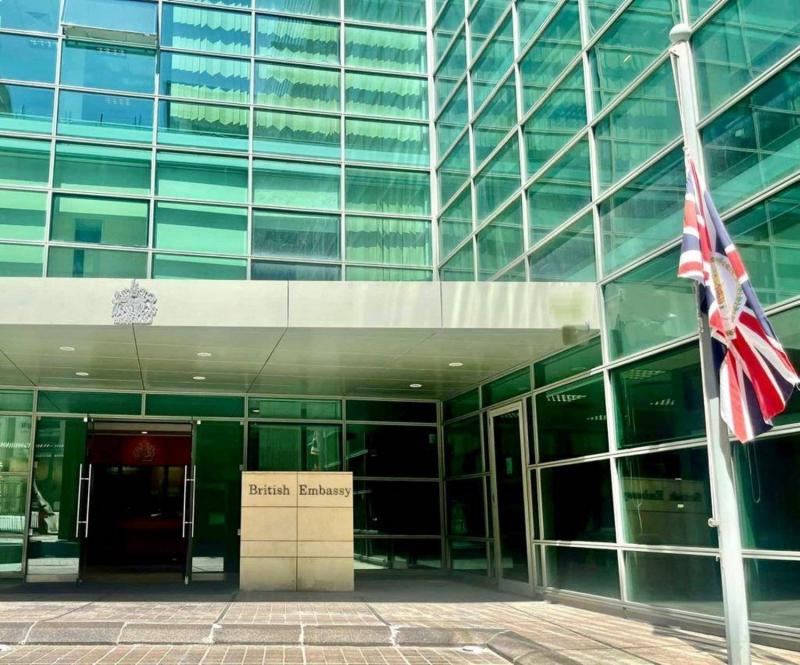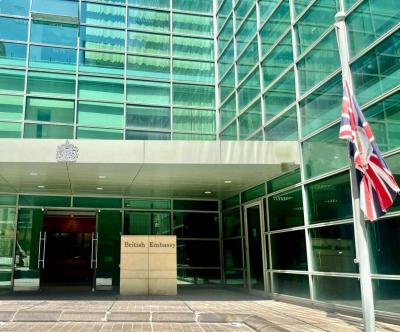The movement of foreign military aircraft to and from Lebanese civil and military airports has increased since the onset of the aggression in Gaza and the outbreak of conflict between Lebanese resistance and the Israeli enemy in the south. Among the countries showing renewed Western military interest in Lebanon is Britain, the former author of the Balfour Declaration, which appears ready for every possible scenario in occupied Palestine and its surroundings, especially as it has deployed its naval ships and intelligence capabilities to support Israel in its war against Gaza.
Several official, military, and diplomatic sources revealed to the newspaper "Al-Akhbar" that a draft memorandum of understanding is being discussed at official and military levels between the UK government, represented by its ambassador to Lebanon, Hamish Cowell, and the Lebanese government, represented by the Army Commander General Joseph Aoun. The memorandum includes around 20 articles divided into five sections, addressing "securing the host state (Lebanon) and support for the armed forces of the United Kingdom when deployed on Lebanese soil."
The draft does not clarify the reasons, circumstances, goals, or justifications for British forces seeking permission to be deployed in Lebanon, nor does it specify their mission in terms of evacuation plans or training missions, as has been customary in previous memoranda of understanding, the last of which was signed at the end of last year. On the contrary, the memorandum is filled with many articles that clearly affect Lebanese sovereignty and grant British forces privileges on Lebanese territory. A major surprise revealed by an official source is that the memorandum reached the Lebanese side from the British embassy before the "Tsunami of Al-Aqsa" battle began!
While the memorandum interprets "British Armed Forces" to include "all military personnel along with their ships, aircraft, vehicles, stores, equipment, communications, ammunition, weapons, and provisions, in addition to civilian employees affiliated with the forces with aerial, maritime, and land resources and support staff," it does not specify the locations of these forces' deployment or the intended number of troops, equipment, or supplies.
Perhaps the most alarming aspect of the draft is the requested authorities for British forces, such as "ensuring that the entry of British Armed Forces into Lebanese airspace or territorial waters is not hindered, even if this military force does not obtain prior diplomatic clearance," in addition to "guaranteeing maximum priority for military aircraft and medical evacuation flights, including helicopters, and allowing unrestricted access to Lebanese airspace for emergency missions," without defining the nature or limits of these "emergency missions."
Regarding the number of these forces, the draft stipulates legal immunity for British armed forces personnel from arrest or detention by Lebanese authorities and emphasizes the immediate transfer of any detainees to the British military, permitting British military personnel to move in uniform openly carrying their weapons within Lebanese territory.
In its last part, the memorandum ensures that in the event of misinterpretation or non-compliance with the articles, Lebanon cannot resort to any international court or third party to resolve disputes. It also confirms that the memorandum is not subject to the 1969 Vienna Convention related to international treaties.
To seek answers regarding the details of the draft and discussions surrounding it, "Al-Akhbar" attempted to obtain clarifications from the Lebanese Army's Directorate of Guidance and the Lebanese Ministry of Foreign Affairs, in addition to the British embassy in Beirut. While the Directorate of Guidance refrained from commenting, sources close to the Army Commander indicated that "the memorandum pertains to evacuation operations and dates back to a prior period, and it is still under study, with the draft existing in the Ministry of Foreign Affairs."
Sources close to the British embassy in Beirut also confirmed the existence of "a draft memorandum of understanding regarding evacuation and potential humanitarian operations," but emphasized that "the main message is that the United Kingdom is working in coordination with Lebanon based on a mutual dialogue with the Lebanese army. The British are not acting independently without Lebanon's knowledge and approval. The Lebanese army is aware of British plans, and the British are operating within the framework of military cooperation and coordination."
The Lebanese Ministry of Foreign Affairs confirmed it was unaware of the draft, while informed sources revealed that "a committee has been formed within the Army's General Staff to plan a discussion on the draft," and that "the Lebanese army will not accept anything that undermines Lebanese sovereignty." Other official sources stressed that "the memorandum and any other agreement of this kind must pass through a governmental committee before being approved, after a government decision to form a committee to study Western military requests."
Amid the ambiguity and secrecy in Beirut, British media are revealing some of the roles of their country's forces in Lebanon or perhaps uncovering future British military ambitions, which do not realistically align with Britain’s military and financial capabilities. The report published by the "Daily Mail" last month regarding training for hundreds of British paratroopers in Lebanon triggered displeasure within the British Ministry of Defence and even the Foreign Office, necessitating the issuance of a "D-Notice" to the media to withhold military information and to review details with the Ministry of Defence before publishing anything regarding British forces' activities abroad. It is notable that this notice is used in cases of threats to British security and hasn’t been employed since the Iraq War, perhaps.
While the information published by the "Daily Mail" does not gain much credence in Britain, information from "Al-Akhbar" indicates that what was mentioned regarding the presence of personnel from the newly formed British Paratrooper Brigade pertains to the drill conducted with the Lebanese army on September 12 last, and that the number of remaining paratroopers in Lebanon does not exceed forty personnel. However, statements by Chief of the General Staff General Sir Patrick Sanders to British MPs, as reported by the same newspaper, indicated that "the presence of British forces in Lebanon provides insight into the Lebanese decision-making process and the view from the other side of the northern border (with Israel)," leading to what "The Guardian" reported on October 12, citing the British Prime Minister's Office, that "one of the missions of British forces (in the Middle East) is to monitor the transfer of weapons to Hezbollah from Iran and Russia."
Meanwhile, "The Telegraph" broadly indicated on October 10 that "the British forces stationed in Cyprus are engaged in intelligence-gathering missions targeting Hezbollah." It clarified that the British intelligence base situated on Mount Olympus in Cyprus, off the coasts of Lebanon and Syria, monitors Hezbollah activities, and that the listening post known as "RAF Troodos" is considered one of the prominent bases within the Five Eyes intelligence alliance, a security defense agreement signed in the mid-1940s between Britain, the US, Canada, New Zealand, and Australia, revealed after the fall of the Soviet Union.
It is no secret that Britain is struggling to secure its military commitments to support Ukraine in its confrontation with Russia, alongside the significant issues faced by the British armed forces due to their limited number and capabilities to deploy large forces abroad. What are the motives, aside from those announced regarding evacuation missions, behind signing an agreement of this kind between British forces and the Lebanese army? Is Britain attempting to exploit the current circumstances to pass an agreement that would establish a military guardianship over Lebanon, amidst the prevailing political and economic situations in Lebanon and the external context characterized by the diminishing French role in Lebanon, and the fear of renewed Russian interest in Beirut?




